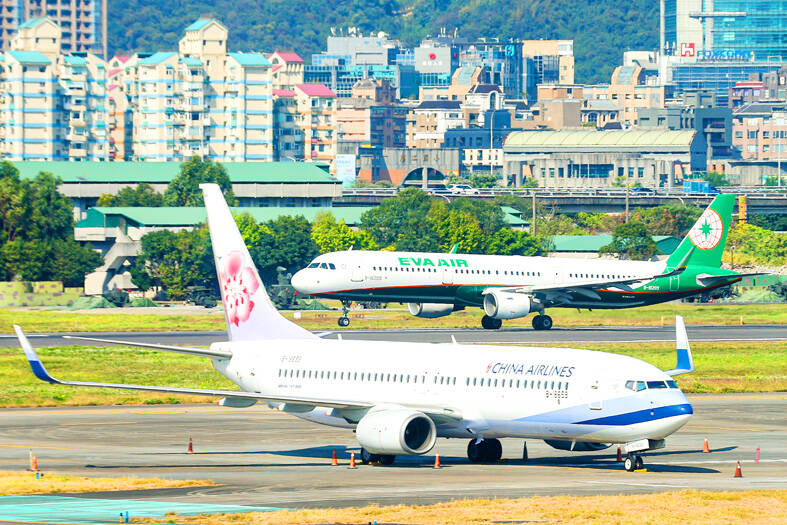China Airlines Ltd (CAL, 中華航空) and EVA Airways Corp (長榮航空) have reported their highest-ever net profit for the first half of the year amid a boom in international travel and growing demand for cargo services.
The global airline industry’s momentum from last year extended into the first six months of this year. That momentum along with an increase in the number of flights supported passenger revenue growth, the two airlines said on Friday.
CAL’s net profit in the first six months of this year hit a new high of NT$7.14 billion (US$220 million), resulting in earnings per share of NT$1.08, the airline said.

Photo: CNA
Revenue generated from passenger flights rose by 17.01 percent from a year earlier to NT$64.68 billion in the January-to-June period, with Northeast Asia, Southeast Asia and North America as the top three sources of revenue, CAL said.
Cargo services were affected by high inflation, interest rate hikes and inventory adjustments in the industrial sector in the early part of the first quarter, the airline said.
However, the situation improved in the second quarter as demand picked up, boosting freight rates and leading cargo revenue to rise 19.98 percent from a year earlier, for the first half of the year, it said.
CAL was also upbeat about its prospects in the second half and said it expects its number of flights to increase by 25 percent this year, citing strong demand for passenger flights during the summer.
Cargo services are also expected to continue to grow in the second half and with all 10 of its Boeing Co 777F cargo planes set to join the CAL fleet this year, the carrier said it is hoping to further capitalize on opportunities in the cargo charter flight market.
EVA’s net profit during the January-to-June period also hit a record high of NT$13.38 billion, resulting in an EPS of NT$2.31, the airline said.
In the six-month period, revenue generated from its passenger flight division rose 17.9 percent from a year earlier to NT$72.9 billion, while its cargo services revenue increased by 17.4 percent from last year to NT$22.95 billion, EVA said.
EVA said cargo volume in the first half of the year rose 15.4 percent from a year earlier thanks to growing demand for artificial intelligence applications, an increase in space demand from Chinese e-commerce operators and port congestion, which led some vendors to have items delivered by air rather than sea.
Separately, Starlux Airlines Co (星宇航空) last week won permission to list its shares on the Taiwan Stock Exchange and said it intended to make its main board debut by the end of this year.
Starlux, which trades its shares on the Emerging Stock Board, turned a profit for the first time last year, with a net profit of NT$149 million and EPS of NT$0.08. It reported NT$620 million in net profit and EPS of NT$0.3 for the first quarter of this year.
The carrier has not reported its first-half earnings yet, but its consolidated sales for the first six months rose 65 percent from a year earlier to NT$16.33 billion, boosted by growing revenue from passenger flights and cargo services.

On Tuesday, US President Donald Trump weighed in on a pressing national issue: The rebranding of a restaurant chain. Last week, Cracker Barrel, a Tennessee company whose nationwide locations lean heavily on a cozy, old-timey aesthetic — “rocking chairs on the porch, a warm fire in the hearth, peg games on the table” — announced it was updating its logo. Uncle Herschel, the man who once appeared next to the letters with a barrel, was gone. It sparked ire on the right, with Donald Trump Jr leading a charge against the rebranding: “WTF is wrong with Cracker Barrel?!” Later, Trump Sr weighed

HEADWINDS: Upfront investment is unavoidable in the merger, but cost savings would materialize over time, TS Financial Holding Co president Welch Lin said TS Financial Holding Co (台新新光金控) said it would take about two years before the benefits of its merger with Shin Kong Financial Holding Co (新光金控) become evident, as the group prioritizes the consolidation of its major subsidiaries. “The group’s priority is to complete the consolidation of different subsidiaries,” Welch Lin (林維俊), president of the nation’s fourth-largest financial conglomerate by assets, told reporters during its first earnings briefing since the merger took effect on July 24. The asset management units are scheduled to merge in November, followed by life insurance in January next year and securities operations in April, Lin said. Banking integration,

LOOPHOLES: The move is to end a break that was aiding foreign producers without any similar benefit for US manufacturers, the US Department of Commerce said US President Donald Trump’s administration would make it harder for Samsung Electronics Co and SK Hynix Inc to ship critical equipment to their chipmaking operations in China, dealing a potential blow to the companies’ production in the world’s largest semiconductor market. The US Department of Commerce in a notice published on Friday said that it was revoking waivers for Samsung and SK Hynix to use US technologies in their Chinese operations. The companies had been operating in China under regulations that allow them to import chipmaking equipment without applying for a new license each time. The move would revise what is known

Artificial intelligence (AI) chip designer Cambricon Technologies Corp (寒武紀科技) plunged almost 9 percent after warning investors about a doubling in its share price over just a month, a record gain that helped fuel a US$1 trillion Chinese market rally. Cambricon triggered the selloff with a Thursday filing in which it dispelled talk about nonexistent products in the pipeline, reminded investors it labors under US sanctions, and stressed the difficulties of ascending the technology ladder. The Shanghai-listed company’s stock dived by the most since April in early yesterday trading, while the market stood largely unchanged. The litany of warnings underscores growing scrutiny of